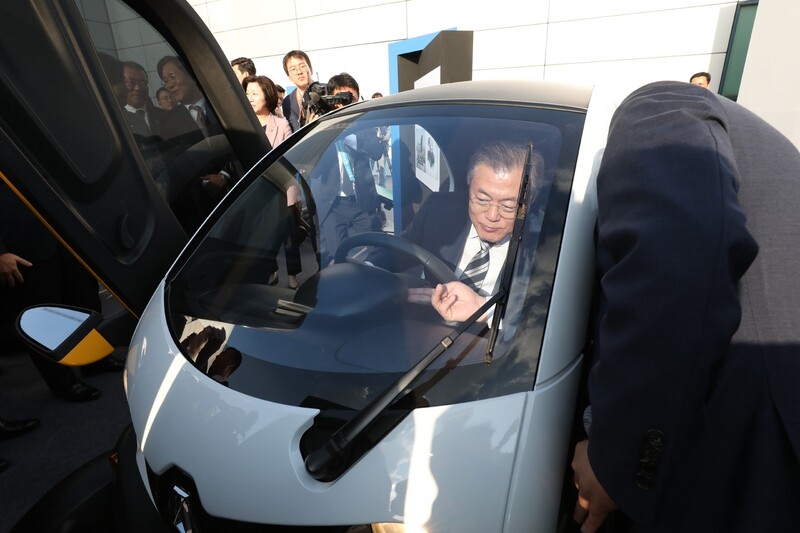hankyoreh
Links to other country sites 다른 나라 사이트 링크
Hyundai Motor Group presents plan to develop customized services and products

The Hyundai Motor Group announced the launch of “Hyundai Developers,” an open-platform vehicle data developers’ portal, during an Oct. 15 visit by President Moon Jae-in to the Hyundai Kia Motors Namyang Technological Research Center in Hwaseong, Gyeonggi Province. Its aim is to create a favorable business environment for the development of customized services and products by start-ups by granting outside access to data gathered through its millions of connected cars and servicing network on areas including vehicle specifications, condition, and operation.
Recent changes in the Hyundai Motor Group, which have proceeded from organizational reshuffling to the areas of personnel and investment, have been taking place at an unprecedented rate. Overseas employees have been positioned in the control tower for the R&D headquarters driving its future vehicle technology development strategy, while numerous veterans of global finished vehicle brands have been hired on in the group’s marketing, design, and quality sectors. Last month, the group established plans to form a US$4 billion joint company with Active, an autonomous vehicle company spun off from the US automobile parts company Delphi. Its aim is to make a major leap forward in autonomous vehicle technology by combining huge investment with advanced technology. Many observers have rated Hyundai Motor as falling outside the world’s top 10 in terms of self-driving vehicle development competitiveness.
Hyundai Motor also recently took the plunge into “flying car” development with the creation of a new project division in its strategic technology headquarters to oversee “urban air mobility” development. The Hyundai Motor group is predicted to channel a total of 41 trillion won (US$34.52 billion) by 2025 in future mobility technology and strategy investment, including an investment of 4 trillion won (US$3.37 billion) over the next three years through key parts affiliate Hyundai Mobis to establish technological competitiveness in the future vehicles.
In the past, Hyundai Motor has been a “follower” pursuing rival businesses in the area of finished vehicle manufacturing. Its recent activities, in contrast, reveal a “game changer” strategy of aggressively tackling market changes. The keys for all decision-making within the group are in the hands of Chung Eui-sun, executive vice chairman – and with his emphasis on “improving the constitution” of his organization, many are predicting the pace of changes within the Hyundai Motor Group will only intensify.
“The Hyundai Motor Group is poised to transform from an automobile manufacturer to a service company providing a new experience to customers. We plan to call it a ‘smart mobility solutions provider,’” Chung has said.
At its Technological Research Center on Oct. 15, the group presented and demonstrated its different forms of mobility and the services to be applied to them, including the world’s first unveiling of an export-designed hydrogen electric truck, hydrogen electric cleaning truck, and electric Porter truck.
By Hong Dae-sun, staff reporter
Please direct comments or questions to [english@hani.co.kr]

Editorial・opinion
![[Column] Life on our Trisolaris [Column] Life on our Trisolaris](https://flexible.img.hani.co.kr/flexible/normal/500/300/imgdb/original/2024/0505/4817148682278544.jpg) [Column] Life on our Trisolaris
[Column] Life on our Trisolaris![[Editorial] Penalties for airing allegations against Korea’s first lady endanger free press [Editorial] Penalties for airing allegations against Korea’s first lady endanger free press](https://flexible.img.hani.co.kr/flexible/normal/500/300/imgdb/original/2024/0502/1817146398095106.jpg) [Editorial] Penalties for airing allegations against Korea’s first lady endanger free press
[Editorial] Penalties for airing allegations against Korea’s first lady endanger free press- [Editorial] Yoon must halt procurement of SM-3 interceptor missiles
- [Guest essay] Maybe Korea’s rapid population decline is an opportunity, not a crisis
- [Column] Can Yoon steer diplomacy with Russia, China back on track?
- [Column] Season 2 of special prosecutor probe may be coming to Korea soon
- [Column] Park Geun-hye déjà vu in Yoon Suk-yeol
- [Editorial] New weight of N. Korea’s nuclear threats makes dialogue all the more urgent
- [Guest essay] The real reason Korea’s new right wants to dub Rhee a founding father
- [Column] ‘Choson’: Is it time we start referring to N. Korea in its own terms?
Most viewed articles
- 160% of young Koreans see no need to have kids after marriage
- 2New sex-ed guidelines forbid teaching about homosexuality
- 3Presidential office warns of veto in response to opposition passing special counsel probe act
- 4[Column] Life on our Trisolaris
- 5OECD upgrades Korea’s growth forecast from 2.2% to 2.6%
- 6[Guest essay] Maybe Korea’s rapid population decline is an opportunity, not a crisis
- 7Months and months of overdue wages are pushing migrant workers in Korea into debt
- 8[Column] Can Yoon steer diplomacy with Russia, China back on track?
- 9Bills for Itaewon crush inquiry, special counsel probe into Marine’s death pass National Assembly
- 10Another chaebol heir caught smuggling liquid marijuana into South Korea